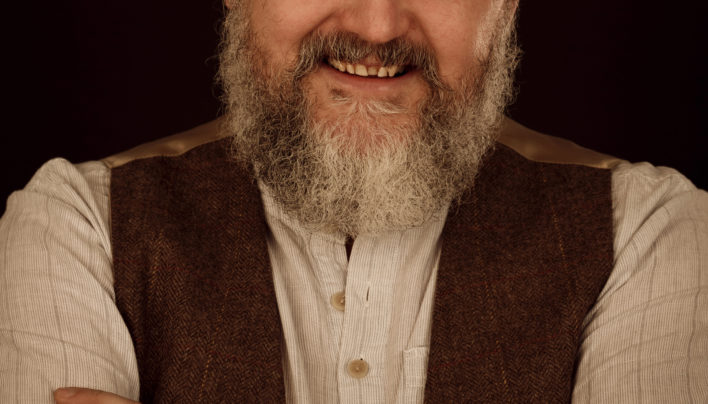Irishman Billy O’Callaghan is the author of newly released novel, My Coney Island Baby – a novel centred around Michael and Caitlin who have been lovers for over a quarter of a century. They are both unhappily married to someone else and have met once a month in a hotel where they rent a bed by the hour, which is from where we witness their lives unfurl on a decaying Coney Island promenade. O’Callaghan subtly portrays the delicate reality of middle-aged love in this beautifully written novel. We’re holding our breath for his new short story collection, Even On Our Longest Days, which is due for release in 2020.
Chloe from Unity Books in Auckland interviewed him to delve deeper into his writing life.
What does a day in the life of Billy O’Callaghan look like?
I live very simply, and keep to a strict routine. Over the years, I have become very disciplined when comes to writing. I get up at 6 am and will be into the story or novel by 7. I like to work through until around noon, and at that point I’ll stop and deal with whatever the day brings. In the early afternoon I’ll read for an hour or two, and after dinner I’ll put another couple of hours in on whatever I’m working on, usually going back over what I’ve written that morning. I write very slowly and feel as if I am always rewriting. I live alone, in a small one-bedroom apartment, and don’t have a television, so the late evening is usually spent reading and listening to music. But if I am working on a novel, and am far enough into it, all the rules fall away and I’ll often still be at it until midnight.
Things do disrupt the routine at times but, generally speaking, this is how I live. And I’ve lived this way for so long now that on the days when I can’t, for whatever reason, spend this kind of time on writing, I struggle to function.
Which writer(s) have inspired you and why?
There are so many, and I am constantly discovering. But my touchstones remain those I’ve been reading and re-reading most of my life, Hemingway, Steinbeck, Golding, Ray Bradbury, Graham Greene. Dozens of others. These are the writers whose books case a spell on me. I am drawn to writing that really lives beneath its surface, and for this reason, I’ve been poring over Dylan’s songs since my early teens. To me, they’re oceans. Also, I am never far from a classic – Dickens, Robert Louis Stevenson, George Eliot, Thomas Hardy. And I love to see a writer in love with language, and who crafts beautiful sentences, so I return often to the likes of Banville, Updike, Norman Mailer, Garcia Marquez, Kawabata, Joyce, Woolf. And when I am a few drafts into a novel, and the rewriting really shifts its focus to the level of language I find myself reading poetry almost exclusively. That seems to be what keeps me closest to the wavelength of the words.
All of these writers, and countless others, have inspired me, but it was my grandmother who lit the fire in me that still burns. Though she died in her early sixties, when I was about seven, she seemed ancient, and she was a natural storyteller. She’d keep me at home from school as often as we could both get away with, and I’d sit enraptured at her feet while she spun yarns of fairies, deaths in the family, her own childhood, the banshee and the Black and Tans. I was shielded from nothing, she put all the magic and the horrors of the world before me, which really allowed my imagination to take flame, and I quickly understood that surfaces weren’t necessarily all there was to see.
Where did the inspiration for My Coney Island Baby come from?
It was my way of trying to come to terms with the challenges of a long-distance romance and the notion of existing on rationed love. In the summer of 2010, I met a woman from Taiwan. Though we could keep in touch every day, circumstances kept us apart, and our opportunities to meet were limited to perhaps a couple of weeks at a time, a couple of times a year. So that was the starting point.
My Coney Island Baby started out as a short story, which was written towards the end of that year. It was published in a journal in the U.S., and that should have been that, but a few months later I woke one morning with the characters once again in my head. At first I ignored them, but after a few weeks gave in and started writing down short pieces, taking notes, thinking that maybe there was another story to be had. The whole thing developed very slowly, and in stop-start fashion, from there. Within a year I understood that I was writing a novel but the book took the better part of seven years to get right.
At one point, maybe around the tenth or dozenth rewrite, in a desperate effort to get a sense of the story as a whole, I printed the manuscript in single-space, 10-point Times New Roman font, cut out each paragraph and blu-tacked the whole thing to the attic wall of my parents’ home, the only available space, then spent every day for the next few weeks poring over the text from start to finish, pulling down little slivers of paper and scribbling notes into their margins, moving scenes and moving them back, trying to reach a stage where I could finally stop and just let it be.
How do you begin to sit down and write your novels?
Usually, by the time I sit down to work on a novel (or short story) the idea will have been a long time in my head. Writing for me is a slow fermentation, and it can take months or even years for the story to be ready enough to write. In the case of most of what I’ve written, the ideas take shape from certain themes that will have been dominating my thoughts for quite a while, usually the things that keep me awake long into the night. Stories are my way of making sense of the world, and my place in it, and what is happening in my own life, and for these reasons they tend to be deeply personal. Most of the time, I feel lost. Stories (and novels) help to give me my bearings. I work things through a fictional veil and in this way figure them out. It’s a painstaking process, even when I think I know the story well, because it is a case of mining the very rawest emotions. And until I am probably half a dozen drafts into a story or novel, I never allow myself to believe that anyone will ever read it. Truthfulness matters, even in fiction, and this belief keeps me from holding myself back.
If you were trapped on an island with only one book, what would it be and why?
Oh, that’s hard. Proust’s In Search of Lost Time, perhaps, if I could cheat a little and pass off six volumes as one book. I’ve long wanted to read it, but the thought of three thousand pages is daunting, and while I have good intentions of getting through the first volume in 2019, I have a feeling I’d need the isolation of an island to properly absorb the lot.
Where did Michael and Caitlin stem from and how did you develop those characters?
As I’ve mentioned, these two characters started out as reflections of my own long-distance relationship, but they are fictional creations, and they were the characters I needed to be able to tell and make sense of the story as I felt it. They developed over a long time, and I think they are both reflections of me, though only in certain ways. I decided to make their affair an illicit one for the purpose of adding tension, a necessary storytelling tool, but I also wanted to show them as flawed and imperfect people. Damaged, even. We all understand that there are varieties of love beyond the Hollywood ideal, and that the heart can’t always help wanting what it wants.
It was essential that they seemed like real people, otherwise I wouldn’t have been able to tell their story, and my hope is that the reader will believe in them, even if they are fictitious. Part of the reason the book took so long to write is that I had to write to a point of understanding as to who they were. They revealed details of themselves only little by little. It’s funny to think about now, but in the seven years I worked on this book I probably spent more time in the company of these two, both in the writing and in the thinking, than I did with anyone else. Ultimately, they are ordinary types, but their story, ordinary on the surface as that too might be, is the entire world to them. That’s what elevates them, I think.
Was there a section of the novel that was especially difficult / enjoyable for you to write?
Different parts presented different challenges at times but the most emotionally difficult section to write was a part in the second chapter where we learn a little the early years of Michael’s marriage to Barbara and the devastation caused by the death of their only child, James, just a few weeks after his birth. I was a couple of years in to the novel before I wrote this part and I remember waking one morning understanding that it was a missing piece.
The section was inspired by recollections of my brother Richard’s death, in 1979 (the book is dedicated to him). I was very young, but I have vivid memories of the time, in particular the kind of stunned silence and distant stares of my parents. My brother, just a baby, was sent to the children’s hospital in Dublin, and we lived in Cork, a three-hour bus or train journey each way (we had no car). For several weeks my parents would travel up in the mornings and down in the evenings, so that my father could work night shifts in the factory where he was employed. After my brother’s death, we rarely spoke about him, a common way, I suppose, of dealing with such grief. We don’t even have a photograph to remember him by.
Once I realised what Michael’s story needed, it was natural that I would draw on these memories. It was harder than I imagined it would be, but I am glad that the story took the turn it did.
As regards the most enjoyable sections, the chapter set on Inishbofin was particularly satisfying to write, and also the depictions of Coney Island. A sense of place is something I value highly in a novel.
If readers took one thing from your novel, what do you hope it would be?
I would hope that people will read it and feel that, even though it is a fiction, it achieves a certain level of truth. And I hope readers will enjoy the sentences as much as I enjoyed shaping them.






